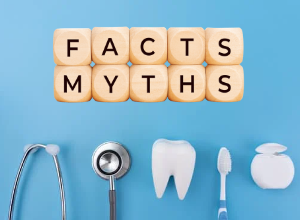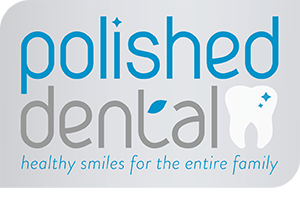
There are many different myths and misconceptions about pretty much everything, but today we are focusing on a few dental myths. Everyday we see patients that believe these myths or misconceptions to be true, so today we are going to set the record straight on a few of them.
IF YOUR GUMS BLEED WHEN BRUSHING OR FLOSSING, THEN YOU SHOULD LEAVE THEM ALONE AND QUIT BRUSHING/FLOSSING
Bleeding gum tissue is an indication that your gums are inflamed and not healthy. That inflammation can be caused from bacteria and tartar building up in those hard to reach areas. If you aren't brushing or flossing on a regular basis, you will most likely experience bleeding gums. If you do notice bleeding with brushing or flossing, the best thing you can do is continue brushing and flossing regularly, and typically within 2 weeks or less the bleeding should resolve. If you don't see improvement, it may be time for a dental cleaning, so see your dental professional to have your gum tissue and bone support evaluated.
THE HARDER YOU BRUSH, THE CLEANER YOUR TEETH WILL BE
Brushing with a toothbrush that is too stiff, or using too much pressure when brushing can actually cause more harm than good. It is possible to wear away the outer layer of enamel or wear down your gum tissue causing receding gum tissue. It is best to use a soft or extra soft toothbrush at all times, using very light pressure when brushing.
KIDS DON'T NEED TO BRUSH THEIR TEETH, THEY WILL LOSE THEM ANYWAY
Primary teeth (aka baby teeth) have the very important role of holding space for the permanent teeth to erupt as kids get older. Poor brushing and flossing habits will increase the risk of decay in baby teeth, which could lead to early loss of the primary teeth. Setting kids up with good brushing/flossing habits will help prevent tooth problems, even as they get older.
SUGAR IS THE ONLY CAUSE OF TOOTH DECAY
While sugar does contribute to the formation of cavities, it is not the sugar itself that causes the problem, it is the bacteria that eats the sugar. Certain foods and drinks attract bacteria to thrive on and around the teeth. That bacteria then will produce an acidic environment that promotes tooth decay. It is best to rinse and brush after meals to reduce that bacteria and plaque build up, as well as using a fluoride toothpaste or rinse on a regular basis
REGULAR VISITS ARE NEEDED IF NOTHING HURTS
Oftentimes, pain is not associated with dental problems, at least not at first. With small cavities or early gum disease, you usually won't feel pain, and once you finally do, it has turned into a bigger issue. If you wait until a cavity hurts, it could lead to the need for a root canal or extraction, instead of an easy filling. Regular check ups help to stay on top of detection of cavities and gum disease.
Going to the dentist is just as much about preventative care, than just treating a problem. It is so important to go in for those regular check ups as often as your dentist or dental hygienist recommends.

